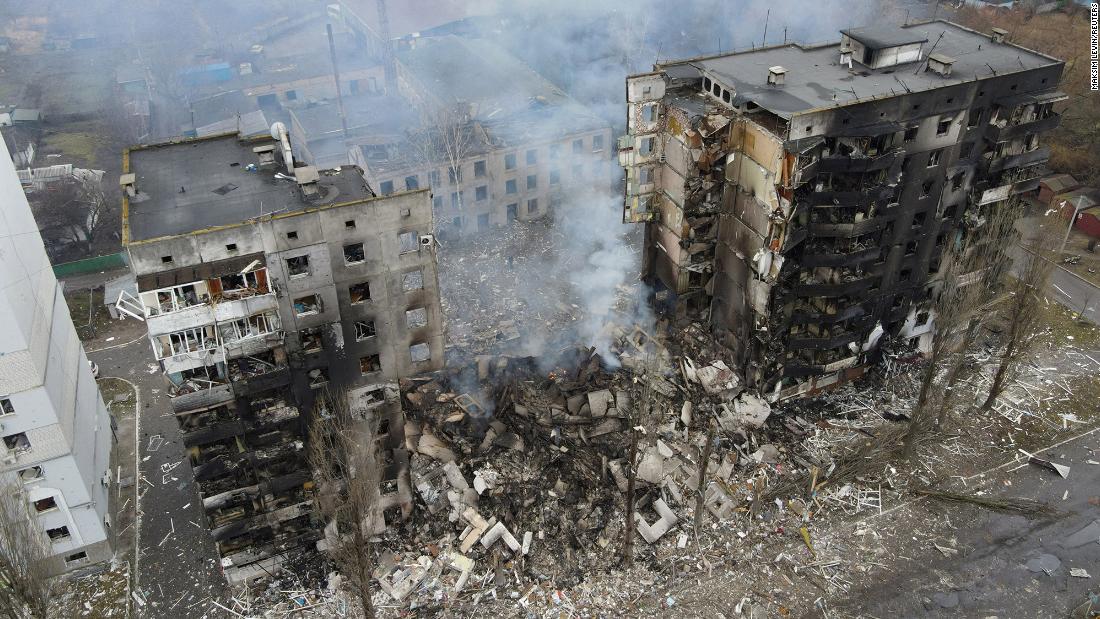
Russia escalates bombing against civilian targets
Orysia Khimiak contributed to this report.
Russia escalated its air campaign against Ukrainian cities on Thursday and through the night into Friday, killing dozens of civilians in the northern city of Chernihiv and continuing to lay siege to residential areas in Mariupol and Kharkiv.
At least 47 people died in Chernihiv, according to Ukrainian emergency services, after aerial attacks damaged high-rise apartments buildings, clinics and a hospital and sent residents fleeing into the streets and to underground bunkers
“We can hear the sounds right now of air strikes nearby,” said Svitlana, 40, who was hiding on Friday morning under her dining table with her two children, aged six and three, and her neighbours in a five-floor apartment building. An apartment building 500m away was destroyed on Thursday, she said.
“There are no military targets here, there is only a cemetery, residential buildings, clinics and a hospital, why are they bombing us?” Svitlana said.
Svitlana’s apartment sits just 50m from a children’s hospital which treats cancer patients. She said children from the oncology ward had been taken to a shelter between the two buildings, but medical staff were not able to create a sterile environment there and were struggling to find a way to evacuate the children.
Reached on Friday morning, Sergey Zosimenko, a charity worker supporting the hospital, told the BBC that the staff were in the process of attempting an evacuation.
Images and video footage from Chernihiv, which is 90 miles (144 km) north of the capital Kyiv and home to about 300,000 people, showed indiscriminate destruction to residential areas, drawing immediate comparisons to the devastating Russian bombing campaigns against Grozny in the late 1990s and Aleppo in 2016. Chernihiv has reportedly been surrounded by Russian forces.
The BBC verified the full names and exact locations of people it spoke to in Chernihiv and other cities under attack but is not publishing those details for safety reasons.
Katya, a 22-year-old nurse in Chernihiv, said she had been able to hear the sounds of continuous shelling throughout Friday morning.
“I’m calling back now because I don’t know if it will be too late, I don’t know if we [will] survive,” she said.
“There is me, my mother, my grandma and our neighbour and we all are hiding in our house. At this very moment I can hear the shelling. Local hospitals and schools are destroyed. Russians promised not to kill civilians but they are killing.”
Larysa, a 52-year-old maths teacher, managed to escape alive with her husband, sister and brother-in-law after their Chernihiv apartment building was hit in a direct strike.
“We were hiding in the staircase near our sixth-floor apartment and we could hear planes flying overhead and they sounded low,” she said. “Suddenly there was a boom and the whole building shook. We ran outside and people were screaming. We could see that the missile went through our building and hit the next building.”
Russia and Ukraine agreed on Thursday to the need for humanitarian corridors to help civilians escape from cities under siege, but residents in Chernihiv and in the southern port city of Mariupol told the BBC on Friday that there had been no significant break in the aerial bombardment to allow people to move.
The escalating strikes on residential areas raised concerns that Russia would continue to target civilians from the air after meeting staunch resistance from Ukraine’s army and failing to make significant progress on the ground. The bombing of Chernihiv on Tuesday came after the Russian president, Vladimir Putin, told French leader Emmanuel Macron that Russia would achieve its military goals in Ukraine “whatever happens”.
Heavy bombardment continued in Mariupol, which entered its third day on Friday without power, water or its sanitation system. The city’s deputy mayor, Serhiy Orlov, told the BBC on Friday that the city council was trying to create a humanitarian corridor to allow civilians to escape.
“We have been preparing everything we can, transport, routes, supplies, but as of Friday morning there is no agreement how and when we can get people out and there has been no break in the shelling,” he said.
Mr Orlov said the Ukrainian army was holding its positions around Mariupol, “but they cannot do anything about aerial bombing”.
“What you have to understand is this is not troops fighting troops, Putin sees destruction and humanitarian crisis as the goal. He wants to terrify people and force them to lose their will.”
In Kharkiv, in the east, Ukrainian authorities said the city had been “pounded all night” by indiscriminate shelling, which UN prosecutors are investigating as a possible war crime.
“Yes the shelling has been constant,” said Elena, a 59-year-old engineer who was hiding in the basement of her apartment building with her daughter and grandchild. “We can hear planes flying overhead and explosions,” she said. “Nothing has hit our building yet.”
Masha, a 24-year-old communications manager in western Ukraine, who’s aunt Larysa survived the direct strike on her Chernihiv apartment building, said had “no feelings right now, only emptiness”.
It is the eighth day of the war and I can’t feel anything – no fear, no nothing. Chernihiv was my second home, and now it’s destroyed,” Masha said.
“I didn’t realise what was really happening until the moment I saw a slow-motion video of a missile hitting the building I used to live in.”
Svitlana, who was sheltering in her apartment with her two children and neighbours, said she could only wait for a break in the shelling.
“We are terrified here but we have to be brave,” she said. “Ukraine above all.”
BBC News
Orysia Khimiak contributed to this report.



